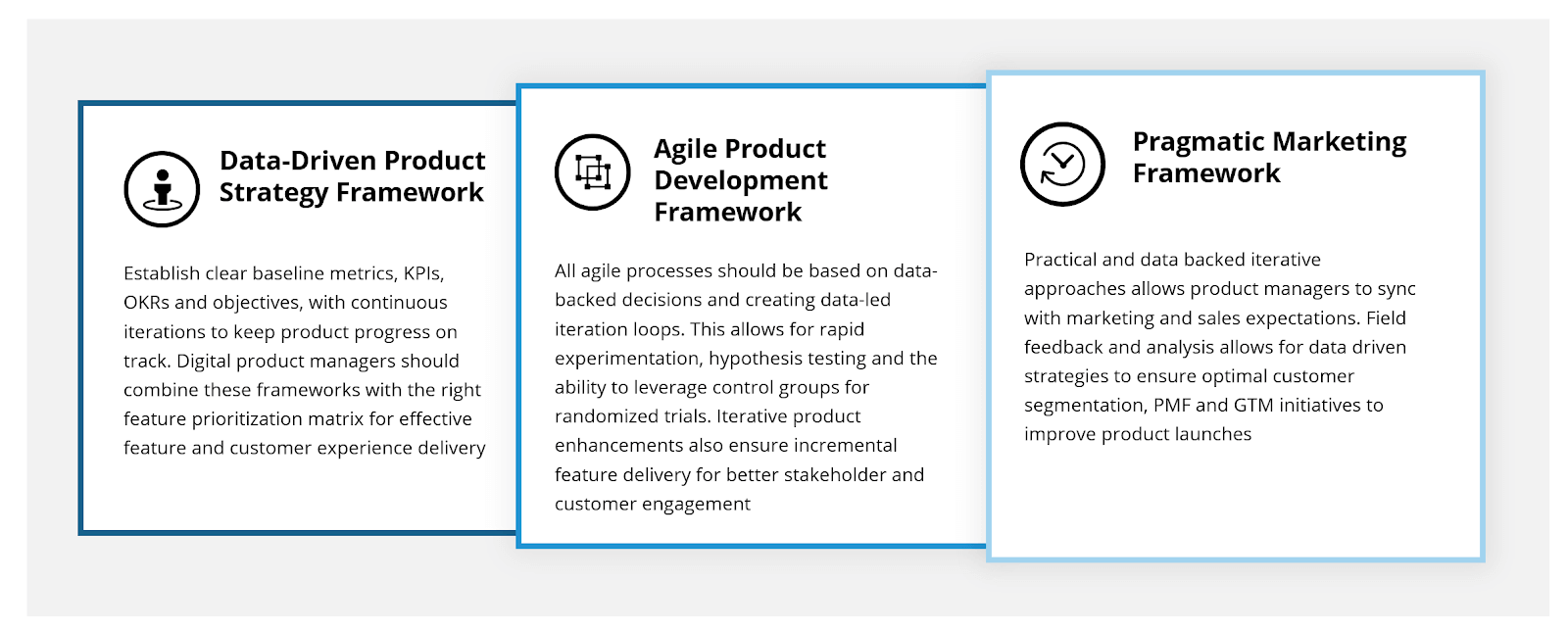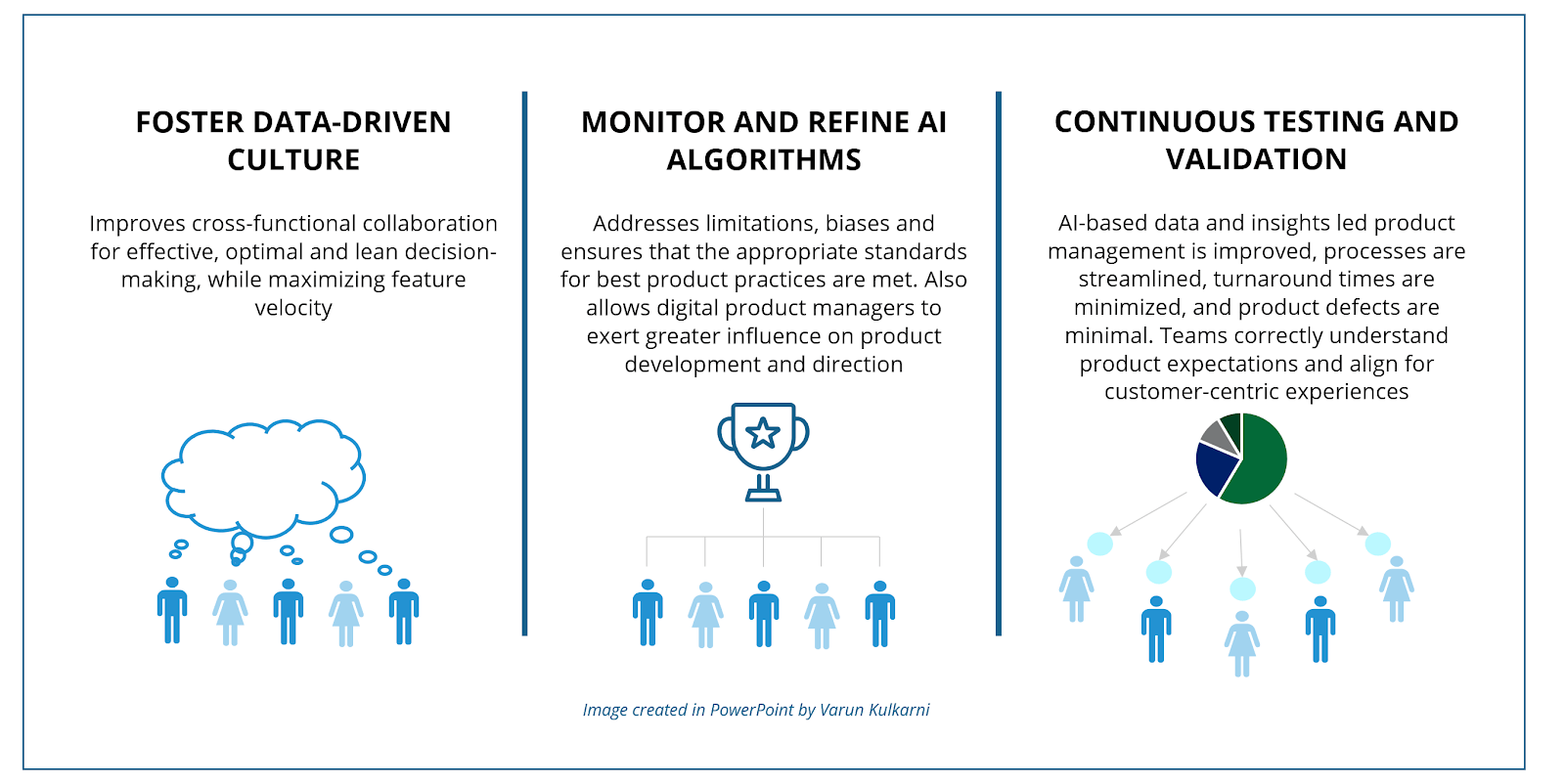

Understanding AI-based data and insights led digital product management
source link: https://www.mindtheproduct.com/understanding-ai-based-data-and-insights-led-digital-product-management/
Go to the source link to view the article. You can view the picture content, updated content and better typesetting reading experience. If the link is broken, please click the button below to view the snapshot at that time.
Published 7 July, 2023
Understanding AI-based data and insights led digital product management
Product leader Varun Kulkarni looks at the benefits of incorporating AI-based approaches into product management practice, and suggests some frameworks and use cases.
Artificial intelligence (AI) and machine learning (ML) technologies are transforming the way organizations manage their digital products and the success of digital product management increasingly depends on leveraging AI-based technologies to gather and analyze vast amounts of data and derive meaningful insights.
In this article, I look at the importance of incorporating AI-based approaches and the significance of AI-based data and insights-led product management. I also present frameworks, strategies and best practices for product leaders. Finally, I highlight some industry-specific use cases to show how AI-based data and insights-led product management led to successful product launches and next-gen customer experiences.
Frameworks for AI-based data and insights-led product management
Digital product managers need data and insights to remain competitive, increase customer retention and acquisition, improve customer experiences and drive revenue. Critical frameworks that provide a structured and systematic approach, promote consistency and replicability, and cover the comprehensive aspects of optimal as well as precise AI implementation are outlined below. I’ve implemented them myself and found that they were very helpful to the successful use of AI-based data and insights.

Figure 1: Frameworks for AI-Based Data and Insights Led Product Management
1. Data-driven product strategy framework
Digital product managers must emphasize defining goals, establishing metrics, and leveraging data to inform product strategy. This involves continuously monitoring and analyzing customer behavior, market trends, and competitor insights to make informed decisions. This framework should be combined with prioritization techniques like the WSJF and Kano Model for effective and customer-centric product experiences. In my experience, the framework helps to deliver precise product feature prioritization, improved product investments, and reduces the risk of product failure. Additionally, it drives product agility, optimization, and efficient resource allocation, allowing the product to stay competitive by increasing customer satisfaction and retention.
2. Agile product development framework
AI-driven insights incorporated into an agile development process will facilitate iterative product enhancements and rapid experimentation. AI-powered analytics tools can be used to monitor product usage, identify user patterns and make data-backed iterations. These further help reduce operational turnarounds and save time as well as overhead product development costs.
3. Pragmatic marketing framework
This framework takes an AI-based data and insights approach to product development that focuses on creating products that align with marketing and sales efforts. Pragmatic marketing enables digital product managers to leverage AI-based data and insights to prioritize features based on customer needs and preferences (think the opportunity scoring feature prioritization process), ensuring that products are aligned with an organization’s goal of being a market leader or differentiator.
Strategies for AI-based data and insights-led product management
Digital product managers can also implement some key strategies to leverage AI-based data and insights effectively. These create streamlined processes, improve cross-functional collaboration, and allow for new product versions on a rolling basis.
Let’s look at two approaches for making better decisions to remain competitive and build products that drive value through differentiation based on AI-focused data and insights.
User-centric approach
You can gain deep insights into user preferences, pain points, and behavior patterns by analyzing user data using AI techniques. These insights enable personalized product experiences, targeted feature development, and effective customer segmentation.
Predictive analytics and forecasting
AI-based predictive analytics can provide valuable insights into future product performance. By analyzing historical data and using ML algorithms, digital product managers can forecast product adoption rates, identify potential bottlenecks, and optimize resource allocation.
Best practice is important for product managers to maximize the benefits of AI-based data and insights-led product management. In an age of commoditized data, AI-based data and insights make for improved customer trust and loyalty with personal choices. Examples are Netflix recommending movies based on what you have watched or Amazon product recommendations based on purchase history.
Best practices for digital product managers
Best practices help to unlock the value of data to stay competitive and deliver exceptional products in an agile way.
Below are what I consider three essential best practices that every digital product manager should follow to implement AI-based data and insights-led product strategies.

Figure 2: Best practices for digital product managers
Cultivate a data-driven culture
A data-driven culture is one that fosters cross-functional collaboration, knowledge sharing and informed decision-making. It is essential to prioritize data literacy and empower team members with the skills to leverage AI tools effectively.
Continuously monitor and refine AI algorithms
AI algorithms should be constantly monitored and refined to ensure accuracy and reliability. Regular audits and testing should be performed to identify and address any biases or limitations in the AI models.
Continuous testing and validation
Continuous testing and validation of products are needed to meet customer needs and expectations. By applying this approach to AI-based data and insights, organizations can test and validate the tools with end-users to ensure they provide customer-centric experiences and feature capabilities and avoid product regressions.
Use cases
Finally, here are a couple of use cases from my own experience of leveraging AI-based data and insights for cutting-edge product management.
Healthcare
In this case, AI algorithms analyzed patient visits and clinician-recommended procedures to identify patterns and provide personalized treatment recommendations for their patient lifecycle. I created strategic frameworks and operational processes as part of the product vision and roadmap. I also used predictive analytics and the WSJF framework to prioritize features that helped healthcare providers optimize resource allocation and predict patient admission rates. The result was a 20% reduction in operational costs of the healthcare information systems and a decrease in average expenses of $24,000 per patient.
Technology
While leading the launch of a cloud contact center reporting product, I leveraged an AI-based data strategy framework and AI-driven agile development methodologies to analyze customer and agent behavior, preferences, and agent feedback. We then develop customized features that reduce customer wait time and agent allocation for calls in queue. This led to a 30% increase in agent efficiencies for calls handled per day.
Conclusion
In conclusion, AI-based data and insights-led product management have become crucial practices in today’s data-driven world. By leveraging AI algorithms and advanced analytics, digital product managers can unlock the value of data, inform product strategy, and drive innovation.
The frameworks, strategies, and best practices outlined in this article provide a roadmap for digital product managers to incorporate AI in their decision-making processes effectively. With the potential to revolutionize industries, AI-based data, and insights-led product management hold immense promise for organizations seeking to stay competitive and deliver exceptional products in the digital age.
Recommend
About Joyk
Aggregate valuable and interesting links.
Joyk means Joy of geeK
